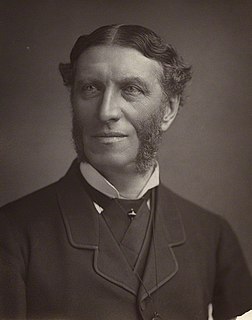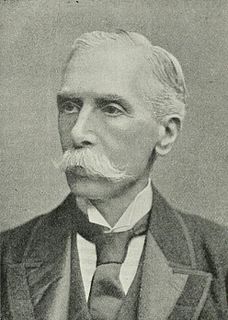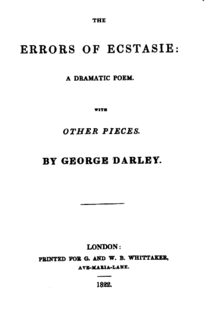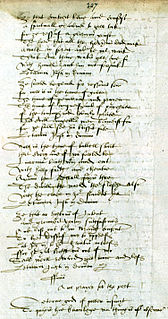
Matthew Arnold was an English poet and cultural critic who worked as an inspector of schools. He was the son of Thomas Arnold, the celebrated headmaster of Rugby School, and brother to both Tom Arnold, literary professor, and William Delafield Arnold, novelist and colonial administrator. Matthew Arnold has been characterised as a sage writer, a type of writer who chastises and instructs the reader on contemporary social issues. He was also an inspector of schools for thirty-five years, and supported the concept of state-regulated secondary education.

Henry Austin Dobson, commonly Austin Dobson, was an English poet and essayist.

George Edward Bateman Saintsbury, FBA, was an English critic, literary historian, editor, teacher, and wine connoisseur. He is regarded as a highly influential critic of the late 19th and early 20th century.

Rev George Gilfillan was a Scottish author and poet. One of the spasmodic poets, Gilfillan was also an editor and commentator, with memoirs, critical dissertations in many editions of earlier British poetry.

Alfred Austin was an English poet who was appointed Poet Laureate in 1896, after an interval following the death of Tennyson, when the other candidates had either caused controversy or refused the honour. It was claimed that he was being rewarded for his support for the Conservative leader Lord Salisbury in the General Election of 1895. Austin's poems are little-remembered today, his most popular work being prose idylls celebrating nature. Wilfred Scawen Blunt wrote of him, “He is an acute and ready reasoner, and is well read in theology and science. It is strange his poetry should be such poor stuff, and stranger still that he should imagine it immortal.”
The Scottish Renaissance was a mainly literary movement of the early to mid-20th century that can be seen as the Scottish version of modernism. It is sometimes referred to as the Scottish literary renaissance, although its influence went beyond literature into music, visual arts, and politics. The writers and artists of the Scottish Renaissance displayed a profound interest in both modern philosophy and technology, as well as incorporating folk influences, and a strong concern for the fate of Scotland's declining languages.

George Darley (1795–1846) was an Irish poet, novelist, literary critic, and author of mathematical texts. Friends with such literary luminaries as Charles Lamb, Thomas Carlyle, and John Clare, he was considered by some to be on a level with Tennyson in “poetic possibilities” in the 1840s, but in the words of famous literary critic George Saintsbury “he had the marks of a talent that never did what it had it in it to do.”

James Thomson, pen name B. V., was a Scottish journalist, poet, and translator. He is most often remembered for The City of Dreadful Night, a poetic allegory of urban suffering and despair. Thomson's pen name derives from the names of the poets Shelley and Novalis, both strong influences on him as a writer. Thomson's essays were written mainly for National Reformer, Secular Review, and Cope's Tobacco Plant. His longer poems include "The Doom of a City" (1854), "Vane's Story" (1865), and the Orientalist ballad "Weddah and Om-El-Bonain". He admired and translated the works of the Italian poet Giacomo Leopardi and Heinrich Heine. In the title of his biography of Thomson, Bertram Dobell dubbed him "the Laureate of Pessimism".
Tom Leonard was a Scottish poet, writer and critic. He was best known for his poems written in Glaswegian dialect, particularly his Six Glasgow Poems and The Six O'Clock News. His work frequently dealt with the relationship between language, class and culture.
Nationality words link to articles with information on the nation's poetry or literature.
Nationality words link to articles with information on the nation's poetry or literature.
Nationality words link to articles with information on the nation's poetry or literature.
Literature written in the English language includes many countries such as the United Kingdom and its crown dependencies, Republic of Ireland, the United States, and the countries of the former British Empire. The English language has developed over the course of more than 1,400 years. The earliest forms of English, a set of Anglo-Frisian dialects brought to Great Britain by Anglo-Saxon invaders in the fifth century, are called Old English. Beowulf is the most famous work in Old English, and has achieved national epic status in England, despite being set in Scandinavia. However, following the Norman conquest of England in 1066, the written form of the Anglo-Saxon language became less common. Under the influence of the new aristocracy, French became the standard language of courts, parliament, and polite society. The English spoken after the Normans came is known as Middle English. This form of English lasted until the 1470s, when the Chancery Standard, a London-based form of English, became widespread. Geoffrey Chaucer, author of The Canterbury Tales, was a significant figure in the development of the legitimacy of vernacular Middle English at a time when the dominant literary languages in England were still French and Latin. The invention of the printing press by Johannes Gutenberg in 1439 also helped to standardise the language, as did the King James Bible (1611), and the Great Vowel Shift.
George Barlow was an English poet, who sometimes wrote under the pseudonym James Hinton.
Decasyllabic quatrain is a poetic form in which each stanza consists of four lines of ten syllables each, usually with a rhyme scheme of AABB or ABAB. Examples of the decasyllabic quatrain in heroic couplets appear in some of the earliest texts in the English language, as Geoffrey Chaucer created the heroic couplet and used it in The Canterbury Tales. The alternating form came to prominence in late 16th-Century English poetry and became fashionable in the 17th Century when it appeared in heroic poems by William Davenant and John Dryden. In the 18th Century famous poets such as Thomas Gray continued to use the form in works such as "Elegy Written in a Country Churchyard". Shakespearean Sonnets, comprising 3 quatrains of iambic pentameter followed by a final couplet, as well as later poems in blank verse have displayed the various uses of the decasyllabic quatrain throughout the history of English Poetry.
The Threnodia Augustalis is a 517-line occasional poem written by John Dryden to commemorate the death of Charles II in February 1685. The poem was "rushed into print" within a month. The title is a reference to the classical threnody, a poem of mourning, and to Charles as a "new Augustus". It is subtitled "A Funeral-Pindarique Poem Sacred to the Happy Memory of King Charles II," and is one of several poems on the subject published at the time.
The National Reformer was a secularist weekly publication in 19th-century Britain (1860-1893), noted for providing a longstanding "strong, radical voice" in its time, advocating atheism. Under the editorship of Charles Bradlaugh for the majority of its lifespan, each issue stated that "The editorial policy of the Paper is Republican, Atheistic, and Malthusian, but all opinions are freely admitted, provided only that they be expressed reasonably and in proper language."

Poetry of Scotland includes all forms of verse written in Brythonic, Latin, Scottish Gaelic, Scots, French, English and Esperanto and any language in which poetry has been written within the boundaries of modern Scotland, or by Scottish people.

Scottish literature in the nineteenth century includes all written and published works in Scotland or by Scottish writers in the period. It includes literature written in English, Scottish Gaelic and Scots in forms including poetry, novels, drama and the short story.
Evelyn Hope is a poem written by Robert Browning in his work "Men and Women", 1855.









